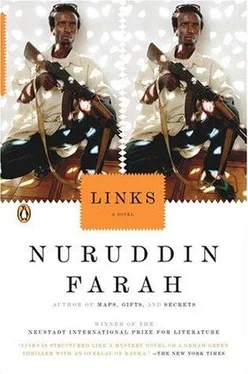“Why ‘was,’ why not ‘is’?”
“Because when she’s returned to us, she’ll have changed from the child I knew as my baby, and will have become a total stranger to me. She’ll have been tortured. No child can survive this kind of torment. Her days of captivity will haunt her forever. My daughter is living in fear.”
“No hard news about her, none whatsoever?”
“No one tells me anything.”
“Why haven’t you spoken of your worries to Bile?”
“For fear that he might think I am inventing things,” she said.
“I feel certain that he won’t,” Jeebleh said.
“Unless it rings when he is here, he won’t believe me, he’ll assume that I am a distraught mother inventing things, like the ringing of a phone with no one at the other end. It’s possible that someone is keeping an eye on my movements, and on whoever comes here. The phone rings after Bile has come and gone, not when he is here. Am I mad and imagining things? I don’t know. Maybe I hear the phones ringing in my head, because I wish someone to get in touch with me. I am alone for much of the time, you see. I’ve no friends left. Many of them avoid me, because I keep talking about Raasta and Makka. But even in my madness, my daughter wants to come home, to me, away from the deceivers!”
When he heard her say “deceivers,” he concluded that she wasn’t completely mad, for he knew whom she meant. He felt more bound to her now, felt a deeper kinship, as a fellow sufferer at their hands.
She said, “I am a mother, deprived of the company of her loving daughter. It shouldn’t surprise you or anyone else if I follow a bend and go where madness, beckoning to my sense of despair, is the supreme authority.”
“You’re not mad!” he assured her.
“I only have circumstantial evidence,” she said, and the sad memory of what scanty evidence she had made her bend over. She held her head between her knees, sobbing.
They were back in her preteen years, when she used to embark on bouts of intense caterwauling, crying her throat sore until she got what she was after. Now she was a tantrum-throwing kid. She could contain herself one minute in lawyerese, her syntax perfect, her logic impeccable, and in the next minute burst into tears, and look mad and miserable.
He wouldn’t lose hope. He would badger her until he got some adequate answers out of her: “Has anyone that you know of seen Raasta?”
“Af-Laawe has seen Faahiye!”
Clever at taking advantage of anyone with needs, Af-Laawe qualified as one of the deceivers. He had the knack of turning up to offer a hand. Who was Af-Laawe, and what was his role in all this?
“Have you mentioned this to Bile?”
“I have.”
“And his reaction?”
“He promised he would look into the matter.”
“Will he, do you think?”
“I doubt that he ever will!”
She was on firmer ground now. This was clear from her body language and her voice. She sat facing the curtainless window, now open, and the sun reflected in her eye made her appear less sad, but a trifle sterner.
She said, “Because Af-Laawe sees himself as a rival of Bile’s, and as the other, that’s to say, Bile’s darker side, he’s difficult to catch out. Af-Laawe will tell you that he’s committed to the well-being of the dead, as if the dead cared, and that he buries them at no charge, which isn’t true, of course, and that, like Bile, he came upon a windfall of funds with a mysterious origin. The truth is different. We know where Af-Laawe’s money came from, that he is a devious fellow, and that Caloosha is his mentor — the overall head of what I’d like to call, for lack of a better term, the cartel. And don’t think I’m mad or a raving paranoiac — I’m not, I’ll have you know.”
She was making a convincing case, but he wanted to know: “What cartel? What’re you talking about?”
“The business interests of the cartel are suspect,” she said. “Initially established by Af-Laawe as an NGO to help with ferrying and burying the city’s unclaimed dead, it’s recently branched out into other nefarious activities. The cartel, my reliable source has it, sends all the receipted bills to a Dutch charity based in Utrecht. But that doesn’t bother me. What bothers me is what happens before the corpses are buried. Terrible things are done to the bodies between the time they are collected in Af-Laawe’s van and the time they are taken to the cemetery. A detour is made to a safe house, where surgeons on retainer are on twenty-four-hour call. These surgeons remove the kidneys and hearts of the recently dead. Once these internal organs are tested and found to be in good working order, they are flown to hospitals in the Middle East, where they are sold and transplanted.”
Jeebleh sat upright. Outlandish as it all sounded, he remembered being present when the corpse of the ten-year-old at the airport was transferred into Af-Laawe’s van, and that the young man killed in his hotel room was put in the same van. He remembered how quickly Af-Laawe had acted to move the bodies, and how he had arranged for Jeebleh to ride in another car from the airport, although he had clearly intended to pick him up. Maybe there was some grisly truth in what Shanta was saying?
“Is Bile aware of all this?”
“It’s not in his nature to talk, even if he is.”
“Why not?”
“Because he doesn’t wish his integrity questioned.”
A latticework of shadows fell on her face, and Shanta’s features made Jeebleh think of an old canvas in the process of being restored. He saw crevices where there were darker shadows, and imagined scars where the shadows were lighter.
“And you think it’s the cartel that has kidnapped the girls?” he asked. “To get them out of the way so there will be no refuge for those fleeing the fighting? Or are Af-Laawe and Caloosha getting at Bile, each for his own reason?”
“Everything is possible.”
“But the cartel, assuming it does exist, won’t allow the girls to come to harm, will it? Especially if, as you say, Caloosha has something to do with it?”
Shanta was no longer in a mood to answer his questions, and her chest exploded into a mournful lament. She managed to say, despite her emotional state, “The cartel is in the service of evil!”
“Have you spoken to Caloosha about your worries?”
“I have.”
“His response?”
“He says he is doing all that he can to have the girls traced. He says they are probably being held in the south of the city, which is not under his — StrongmanNorth’s — jurisdiction, but StrongmanSouth’s. But you know why I think he too won’t help at all? Because the cartel’s source of corpses will dry up if Raasta is back in circulation.”
“Che maledizione!” Jeebleh cursed.
Snuffling more mightily, she trotted off, head down and body trembling, in the direction of a door that he assumed would lead to the toilet, presumably to complete her crying away from his gaze. He heard the boy moving about upstairs and muttering, perhaps entertaining himself with talk. But who was the boy? What was he doing here?
Shanta was away for at least fifteen minutes, and when she returned she sat from across him, not quite recomposed. She crossed and recrossed her legs, reminding him of an agitated mother hen fighting with all her might to save her chicks from the vulture preying on them.
AT JEEBLEH’S SUGGESTION, THEY MOVED OUT TO THE GARDEN, WHERE THEY sat on a bench under a mango tree, its shade as sweet as the fruit itself. Unwatered and ravaged by neglect, the garden was a comfortless witness to the nation’s despair, which was there for all to see.
“Whose house is this?” he asked.
She looked away, first at the mango tree, which had begun to bear fruit, and then at a colorful finch hanging over one of the branches, cheerfully young and full of chirp. “Our own house is in an area that in the days when you lived here was known as Hawl-Wadaag but that has recently been named Bermuda. The neighborhood was destroyed in the fighting between StrongmanSouth and a minor warlord allied with StrongmanNorth. This house belongs to friends of mine who’ve moved to North America.”
Читать дальше












